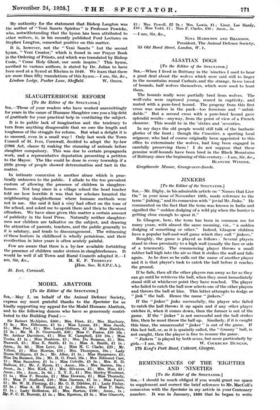JINKERS
[To the Editor of the SPECTATOR.] SIR,—Mr. Digby, in his admirable article on " Names that Live On" in your issue of November 10th, made reference to the term " jinking," and its connexion with " jovial Mr. Jinks." He commented on the fact that the term was known in India and signified the " sudden dodging of a wild pig when the hunter is getting close enough to spear it."
In Glasgow, here, the term has been in common use for many years, with almost the same meaning, viz., " a sudden dodging of something or other." Indeed, Glasgow children have a popular ball-and-wall game which they call " jinkers."
Roughly, the game is played as follows : Several players stand in close proximity to a high wall (usually the face or side of a tenement). The commencing player throws a small rubber ball high into the air so that it strikes the wall and falls again. As he does so he calls out the name of another player and it is that player's task to catch the ball before it reaches the ground.
If he fails, then all the other players run away as far as they can go until he retrieves the ball, when they must immediately stand still at whichever point they have reached. The player who failed to catch the ball now selects one of the other players and throws the ball at him. This latter attempts to dodge or " jink " the ball. Hence the name " jinkers."
If the " jinker " jinks successfully, the player who failed to catch the ball throws it up again and if any other player catches it, when it comes down, then the former is out of the game. If the " jinker " is not successful and the ball strikes him, then he must throw the ball up. Similarly, if it is caught this time, the unsuccessful " jinker " is out of the game. If this last ball, or, as it is quaintly called, the " Granny " ball, is not caught, then the player is free to resume the game. " Jinkers " is played by both sexes, but more particularly by


















































 Previous page
Previous page